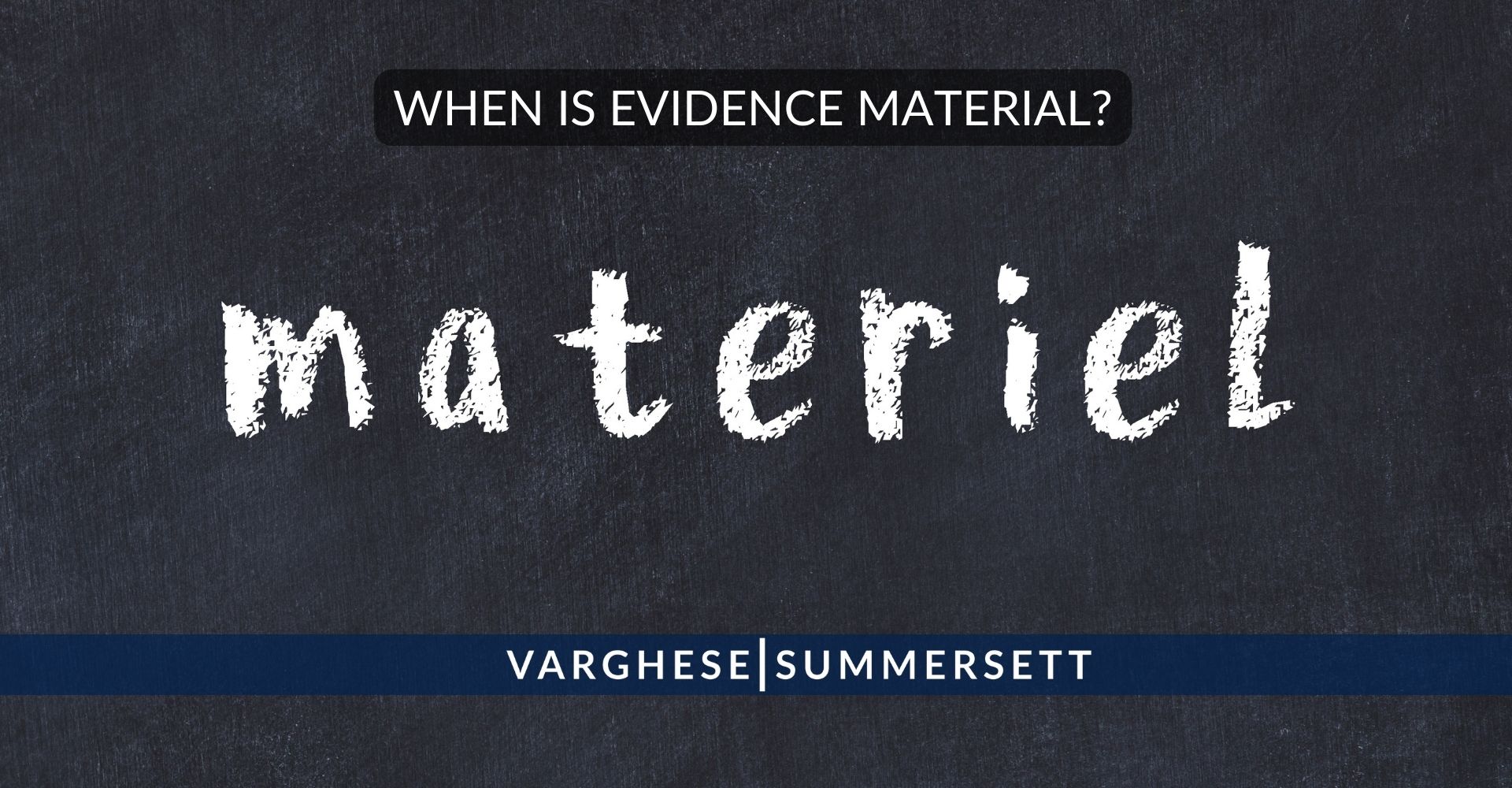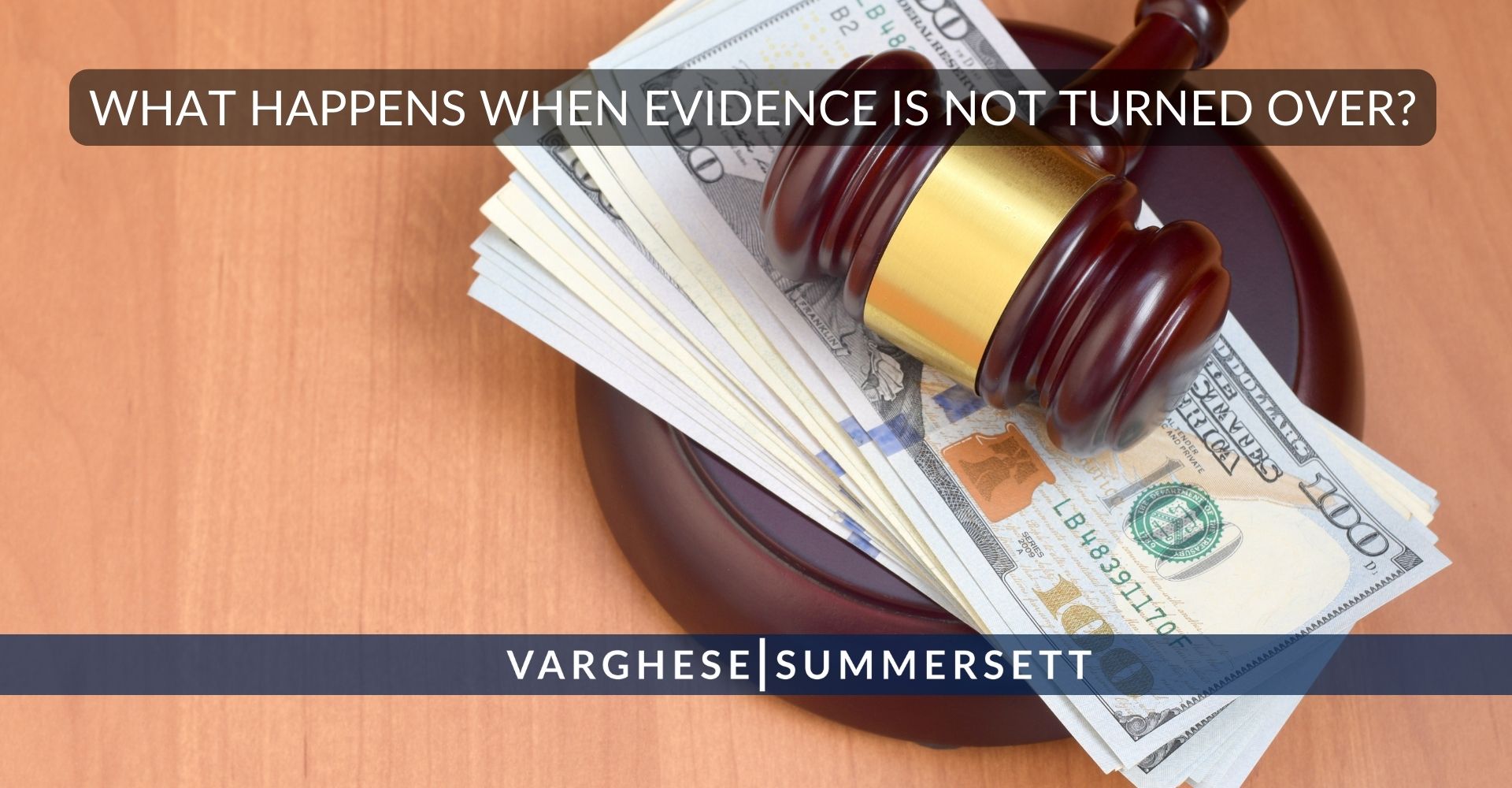On June 12, 2024, the Court of Criminal Appeals handed down its decision in Heath v. State. The State v. Heath decision affirmed that Texas law by statute requires prosecutors to disclose all relevant evidence in the possession of the State, regardless of whether the prosecutor had knowledge of the evidence. This post explores what that means, why it is important, how it fits in with existing case law, and where prosecutors and defense lawyers go from here.

The Power and Responsibility of Prosecutors
When a prosecutor stands up in court and says they represent the State of Texas, they do exactly that. Prosecutors have all the powers inherent to the state—endless budgets for investigation combining local law enforcement with the investigative powers of the grand jury and prosecutors’ own investigators. They also bear the responsibility of knowing everything the state has collected and has in its possession. The prosecution also bears the responsibility of turning over all relevant information.
Criminal Discovery Backdrop: 39.14 and the Michael Morton Act
Prior to the Michael Morton Act, the right to discovery in criminal cases in Texas was quite limited. At the time, Article 39.14 of the Texas Code of Criminal Procedure allowed for a more limited scope of discovery in criminal cases:
Limited Discovery Rights
Defense attorneys could request specific documents and evidence, but the scope of what could be demanded was narrower, and the burden was largely on the defense to specify exactly what they sought.
Good Cause Requirement
The defense needed to show good cause for why they should be granted access to certain pieces of evidence. This requirement often necessitated arguing for the relevance and necessity of each piece of evidence in court.
Judicial Discretion
The decision to grant discovery requests was left to the discretion of the court. This could result in inconsistencies in what evidence was made available to the defense depending on the judge’s perspective on what constituted good cause.
Limited Automatic Disclosure
Prosecutors were not generally required to provide all evidence favorable to the defense automatically. The prosecution’s duty to disclose was restricted to what was directly asked for and proven to be necessary by the defense.
The Burden to Turn Over Evidence
The Michael Morton Act, enacted in 2013, significantly amended Article 39.14. It was named after Michael Morton, a man who was wrongfully convicted in 1987 of murdering his wife. He spent nearly 25 years in prison before DNA testing proved his innocence in 2011. His case highlighted severe flaws in the criminal justice system, particularly around the withholding of exculpatory evidence by the prosecution.
Background Leading to the Creation of the Michael Morton Act
Wrongful Conviction of Michael Morton

Michael Morton was wrongfully convicted in 1987 for the murder of his wife, Christine Morton, primarily due to prosecutorial misconduct and the withholding of exculpatory evidence by then-district attorney Ken Anderson. Critical evidence that could have proven Morton’s innocence, including statements from his young son, who witnessed the murder and indicated that his father was not the killer, and police reports pointing to another suspect, was deliberately suppressed. This misconduct led to Morton serving nearly 25 years in prison until DNA testing in 2011 linked the crime to Mark Alan Norwood, a convicted felon.
Exoneration and Investigation
Morton was exonerated in 2011 after DNA evidence linked the murder to another individual. The exposure of this evidence, which had been available at the time of the original trial, led to public outcry and demands for reform in the handling of evidence in criminal cases.
Legislative Response
The egregious nature of Morton’s case, combined with his and others’ advocacy, spurred legislative action. Lawmakers and stakeholders sought to prevent such miscarriages of justice by ensuring broader and more stringent disclosure requirements.
Key Provisions of the Michael Morton Act
Broad Disclosure Requirements
The Act requires the prosecution to disclose all police reports and witness statements, among other evidential materials, to the defense.
Proactive Disclosure Obligation
It shifts the burden somewhat from the defense having to request evidence to the prosecution having to automatically provide it.
Open File Policy
The Act essentially enforces an “open file policy” in criminal cases, requiring prosecutors to allow defense attorneys access to investigative files that could contain exculpatory or impeaching information.
Timeliness and Continuity
The Act emphasizes that disclosure must be timely, beginning as early as possible and continuing as new evidence is gathered.
Why We Have the Michael Morton Act
The enactment of the Michael Morton Act was driven by a recognition of the fundamental importance of fairness and transparency in the judicial process. Its provisions aim to:
Prevent Wrongful Convictions
By ensuring that all material evidence, especially exculpatory evidence, is disclosed, the Act sought to to prevent wrongful convictions like that of Michael Morton.
Restore Public Confidence
The legislature hoped the Act would restore and maintain public confidence in criminal prosecutions.
Changes Brought by the Michael Morton Act
The wrongful conviction and eventual exoneration of Michael Morton highlighted significant flaws in this system, particularly the risk of prosecutorial misconduct and the hiding of exculpatory evidence. The Michael Morton Act aimed to address these issues by instituting several important changes:
Expanded Discovery Obligations
The Act broadened the types of evidence the prosecution must automatically disclose to include nearly all materials relevant to the case. This includes police reports, witness statements, and any material that could be considered exculpatory.
Removal of Good Cause Requirement
The new law removed the requirement for the defense to show good cause to access evidence, placing the onus on the prosecution to provide access to evidence without needing specific requests from the defense.
Open File Policy
The Act implemented an open file policy, mandating that the prosecution make available a broader range of evidence, reducing the chances that significant evidence could be withheld, whether intentionally or inadvertently.
Proactive Disclosure Requirement
Prosecutors are now required to disclose all evidence as soon as practicable after it is gathered, and they must continue to disclose new evidence as it becomes available. This ongoing obligation ensures that the defense is kept informed throughout the process.
Documentation of Compliance
The Act also requires that the prosecution document what has been disclosed. This paper trail is intended to increase accountability and provide clear records that can be reviewed for compliance with the law.
After the Michael Morton Act, there remained questions, at least for some prosecutors, about what had to be turned over and how soon those materials had to be turned over. For example, some prosecutors believed they should not have a requirement to turn over evidence that was not admissible, others believed that as long as they turned over the information at some point, they had fulfilled their obligations, while others believed any failure to turn over evidence was not important if the information was not admissible.

After Michael Morton: Watkins Explains Materiality
The case of Ralph Dewayne Watkins v. The State of Texas involves a pivotal discussion on the interpretation of “material” evidence under Article 39.14 of the Texas Code of Criminal Procedure, which was significantly amended by the Michael Morton Act in 2013. This case reached the Texas Court of Criminal Appeals, where the meaning and application of the term “material” in the context of discovery laws were central to the appeal.
Summary of Watkins v. State
In Watkins v. State, the Court addressed whether the word “material” should be construed as “relevant.” The Court concluded that “material” implies relevance to the case’s issues, thereby necessitating disclosure. This interpretation supports a broader open-file policy, requiring prosecutors to provide access to a wider array of evidential materials early in the defense process.
Dissenting Opinion in Watkins
Presiding Judge Keller, in a dissenting opinion, argued that the majority’s interpretation was incorrect. She highlighted that during the legislative process, the specific change from “material” to “relevant” was initially proposed but ultimately not adopted. Keller suggested that the term “material” connotes something more substantial than mere relevance, implying a necessity for the evidence to have significant bearing on the case outcomes.
Prosecutors’ Responsibilities after Michael Morton and Watkins
Watkins v. State clarified that ‘material’ evidence is essentially ‘relevant’ and emphasized the proactive duty of prosecutors to seek out and disclose any relevant evidence under the amended version of Article 39.14. This ruling underscored that the prosecution’s responsibility includes not only evidence they are immediately aware of but also any information that could potentially be relevant, which necessitates a thorough search and continuous disclosure throughout the legal process.

What is relevant evidence?
Definition of “Relevant Evidence” according to Texas Rule 401
Evidence is considered relevant if:
- It has any tendency to make a fact more or less probable than it would be without the evidence; and
- The fact is of consequence in determining the action.
After the Michael Morton Act and the Watkins v. State ruling, prosecutors in Texas were required to disclose all evidence that material to any matter involved in the action, which included all relevant information. There remained questions about what “as soon as practicable” meant in regards to how quickly evidence had to be turned over.
State v. Heath
State of Texas v. Dwayne Robert Heath centers on the statutory obligations of discovery under Article 39.14(a) of the Texas Code of Criminal Procedure, particularly whether items unknown to the prosecuting attorney but held by law enforcement are included in the prosecutor’s duty to disclose evidence “as soon as practicable” after a defense request.
The Decision in State v. Heath
The Texas Court of Criminal Appeals affirmed the lower court’s ruling that law enforcement is encompassed within “the state” for the purposes of discovery obligations. Therefore, the prosecuting attorney is responsible for ensuring that all relevant evidence held by law enforcement is disclosed to the defense. The court held that “as soon as practicable” does not include a knowledge requirement on the prosecutor’s part, which means that the state must provide evidence as soon as it is reasonably possible, irrespective of the prosecutor’s awareness of the evidence.
Court’s Reasoning in Heath
The court’s reasoning is grounded in a textual and purposive interpretation of Article 39.14(a). It emphasized that the statute is designed to facilitate fair trials by ensuring timely and comprehensive evidence disclosure. This includes evidence in possession of any state agency, notably law enforcement, which is considered part of “the state.” The court also indicated that the term “as soon as practicable” implies an obligation of reasonable diligence to uncover and disclose evidence, which does not hinge on the prosecutor’s actual knowledge of the evidence.
Dissent in Heath
Justice Keel, joined by Justice Keller and Justice Yeary, dissented. The dissent argued that the majority’s interpretation unduly broadens the scope of the prosecutor’s duty and undermines the practical administration of justice. They contended that the statute should require some level of prosecutorial knowledge or control over the evidence before triggering the disclosure obligation.
Duty of the Prosecutor to Proactively Seek Discovery Clarified in Heath
The majority opinion in State v. Heath clarifies that the obligation of “the State” to produce discovery “as soon as practicable” includes items that may be unknown to the prosecuting attorney but are in the possession of law enforcement.
Court Makeup in Watkins and Heath
| Case |
Majority Judges |
Dissenting Judges |
| State v. Heath |
Alcala, Hervey, Keasler, Keel, Newell, Richardson, Walker |
Keller (P.J.), Yeary (J.) |
| Watkins v. State |
Hervey, Keel, McClure, Newell, Richardson, Slaughter, Walker |
Keller (P.J.), Yeary (J.) |
Implications for Prosecutorial Conduct
The absence of a mental-state requirement implies that prosecutors cannot solely rely on the evidence that is directly presented to them by law enforcement. Instead, they have a proactive duty to inquire and ascertain what evidence exists within any state agency that might be relevant to the cases they are handling. This duty extends beyond passive receipt of information to an active obligation to seek out potential evidence. The prosecutor must establish and maintain communication channels with associated law enforcement entities to ensure that all relevant information, even that which they are initially unaware of, is discovered and disclosed in compliance with statutory requirements.
Legal and Practical Measures
To fulfill this duty effectively, prosecutors might need to implement specific measures, such as:
Regular Training
Ensuring that both prosecutors and law enforcement officers are regularly trained on the requirements of Article 39.14 and the importance of comprehensive evidence sharing.
Systematic Review Protocols
Developing standardized protocols for reviewing and cataloging all evidence held by law enforcement that might pertain to ongoing cases.
Documentation of Efforts
Maintaining detailed records of the efforts made to discover and disclose evidence, which could be crucial in demonstrating compliance with discovery obligations in court.
Prosecutor’s Duties in Discovery
Broad Scope of Disclosure
As interpreted in both Watkins and Heath, the duty of the prosecutor encompasses all evidence “material to any matter involved in the action,” which essentially means all relevant evidence. This includes evidence in the possession of law enforcement agencies, even if the prosecutor does not have direct knowledge of it.
Proactive Disclosure
The term “material” implies that the prosecutor must seek out relevant evidence that could potentially influence the outcome of the case—not only evidence directly known to them. This proactive duty requires establishing systematic communication and procedures to ensure that all pertinent evidence held by any entity constituting “the State” is disclosed.
Timely Disclosure
The evidence must be disclosed “as soon as practicable” after a request by the defense. This timing underscores a requirement for diligence and efficiency in managing discovery processes without undue delay.
Continual Duty
The duty to disclose is not only prior to the trial but is ongoing. New evidence that comes to light must be disclosed as soon as it is known.

Violations or Failures by Prosecutors
A violation or failure in the duty of discovery can manifest in several ways:
Failure to Disclose Known Evidence
This includes not disclosing evidence that the prosecutor knows about and that is relevant to the defense’s case. Such a failure can directly impact the fairness of the trial.
Negligence in Seeking Out Evidence
If a prosecutor fails to actively seek out evidence from law enforcement or other state agencies that might be relevant, this could constitute a failure in their duty, as established by the proactive standard set in these cases.
Delay in Disclosure
Not disclosing evidence as soon as practicable, thereby delaying the defense’s access to evidence, can also be seen as a violation of the statutory requirements.
Legal Consequences of Failure to Turn Over Evidence
The consequences for failing to meet these discovery obligations can be severe:
Exclusion of Evidence
As noted in Heath, a court may exclude evidence from a trial if it was not disclosed in time, affecting the prosecution’s ability to present its case.
Appeal on Grounds of Prejudice
If a case goes to appeal, the appellate court will examine whether the trial court’s decisions regarding evidence exclusion or the choice of remedy were appropriate given the context of the discovery violation. If the appellate court finds that the nondisclosure prejudiced the defense and the trial court’s remedy was insufficient, it can reverse the conviction.
Standard of Review
The appellate review typically looks at whether the trial judge abused their discretion in handling the discovery violation. This includes reviewing the proportionality and appropriateness of the judge’s response to the violation.
Disciplinary Actions
Prosecutors may face professional disciplinary actions for failing to adhere to ethical standards of disclosure.

Defense Lawyer’s Duties in Discovery
Defense attorneys in Texas have several strategic steps they can take to ensure compliance with discovery laws, especially in light of the provisions of Article 39.14 of the Texas Code of Criminal Procedure and the implications of recent court rulings on discovery obligations. Here’s a guide on how they can manage the discovery process and related trial proceedings effectively:
Request Discovery Early
Immediate Requests
As soon as they are retained or appointed, defense attorneys should make a formal request for all discovery materials under Article 39.14. This should be done promptly after the indictment to ensure that the prosecution provides all relevant evidence as early as possible.
Document Requests
All requests should be well-documented and filed officially, leaving a clear paper trail. This helps in establishing timelines that might prove crucial if a discovery violation needs to be argued later.
Monitor Prosecution’s Readiness
Track Announcements
Defense attorneys should carefully monitor and record every instance where the state announces readiness for trial. This is important because it indicates the prosecution’s assertion that they have complied with all necessary pre-trial preparations, including discovery obligations.
Challenge Readiness
If there is any doubt about the completeness or timeliness of the discovery provided, the defense should challenge the state’s readiness. This might involve questioning the state’s declaration of readiness and requiring them to prove that they have indeed disclosed all required evidence.
Formal Continuance Requests
Request for Sworn Continuances
If the prosecution is not ready and seeks a continuance, the defense should request the court to require the prosecution to file a formal, sworn continuance petition. This petition should explain why the continuance is necessary, which adds a layer of formal scrutiny to the prosecution’s readiness and compliance with procedural rules.
Record in Court
Each request or claim of readiness by the state should be put on the record. This ensures that all parties’ statements are formally noted, which can be critical in appeals or further legal challenges.
Understand and Leverage Continuance Rules
Code Requirements
Defense attorneys should be well-versed in the requirements set forth by the Texas Code of Criminal Procedure regarding continuances. Article 29.03 specifies that the first continuance requested by the prosecution must be supported by an affidavit showing sufficient cause.
Subsequent Continuances
For any subsequent continuance, as per Article 29.04, the prosecution must prove “material” evidence that is expected to come to hand if the continuance is granted; the material evidence must not merely be cumulative; and there must be reasonable grounds to believe that such evidence will be obtained at the later date.
Advocacy and Vigilance
Active Advocacy
Defense attorneys must actively advocate for their clients’ rights to timely and complete discovery. This includes being vigilant about the prosecution’s compliance with discovery laws and readiness announcements.
Prepare for Challenges
Be prepared to challenge insufficient discovery and improper readiness claims through pre-trial motions and, if necessary, appeals. The preparation should include potential motions to exclude evidence that was not properly disclosed.
State v. Heath Opinion
State v. Watkins Opinion